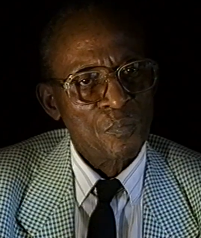Théodore Sindikubwabo
| Théodore Sindikubwabo | |
|---|---|
 |
|
| President of Rwanda | |
|
In office April 9, 1994 – July 19, 1994 |
|
| Preceded by | Juvénal Habyarimana |
| Succeeded by | Pasteur Bizimungu |
| Personal details | |
| Born | 1928 Butare, Rwanda |
| Died | 1998 (aged 69–70) Bukavu, Democratic Republic of the Congo |
| Nationality | Rwandan |
Théodore Sindikubwabo (1928–1998) was the fourth and interim President of Rwanda during the Rwandan genocide, from April 9 to July 19, 1994. Prior to that he was President of the National Development Council (Parliament of Rwanda) 1988–1994.
Born in the town of Butare in the south of Rwanda, Sindikubwabo was educated as a physician, and was Minister of Health in the administration of President Kayibanda. Following the takeover by Juvénal Habyarimana, Sindikubwabo became a practising pediatrician in Kigali Central Hospital. He later returned to politics as a deputy in parliament.
Immediately following Habyarimana's assassination on April 6, 1994, Sindikubwabo was installed as interim President by the Crisis Committee controlled by Colonel Théoneste Bagosora, and he was the head of state during the genocide. Some scholars and the British MI6 report that Sindikubwabo and Hutu hardliners organized Habyarimana's assassination due to concerns over the Arusha Accords with the aid of French intelligence. Sindikubwabo is widely believed to have been a puppet of the group of military officers who held the real power. On 19 April 1994, he made a now infamous speech at the ceremony appointing a new Préfet (Governor) of Butare that was broadcast on national radio, in which he insulted those who were not "working", a euphemism for killing Tutsis, and told them to "get out of the way and let us work". On 29 April, he returned to Butare and told the populace that he was there to supervise the killing of Tutsi. On an 18 May visit to Kibuye Prefecture, he congratulated the people on how well they had done their "work".
Following the invasion of the Rwandese Patriotic Front that took control of the country and ended the genocide, Sindikubwabo fled to Zaire (now the Democratic Republic of the Congo), where he lived in exile in Bukavu. He was interviewed there for the book We Wish to Inform You That Tomorrow We Will Be Killed With Our Families and quoted as saying: "The moment has not yet come to say who is guilty and who is not guilty." He was initially reported to have been killed in the Rwandan government attack on Bukavu in November 1996 at the beginning of the First Congo War, but subsequent reports put him in Kinshasa. He died in exile in Democratic Republic of the Congo in the late 1990s of natural causes and was never charged by the International Criminal Tribunal for Rwanda.
...
Wikipedia
